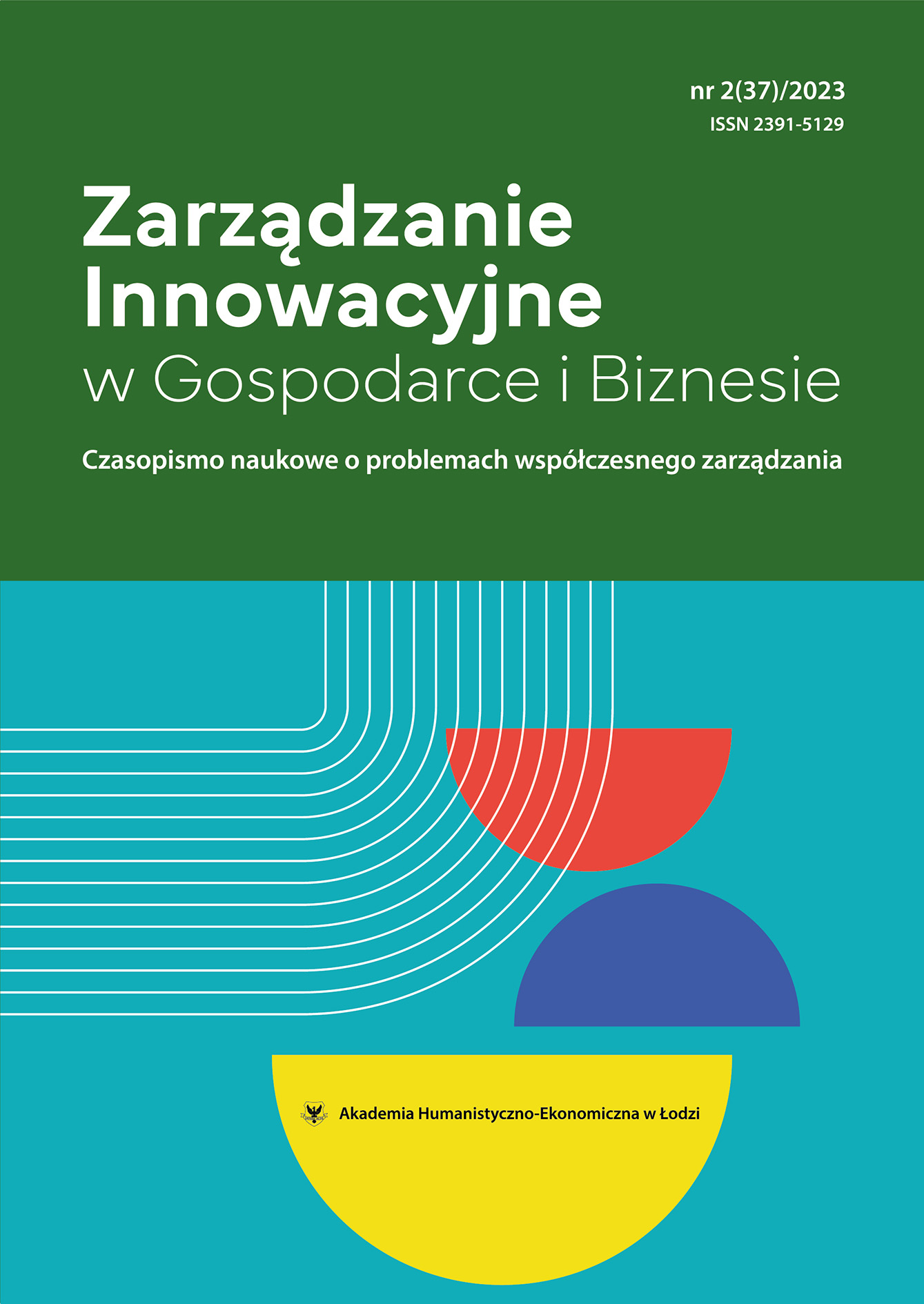Zrównoważony rozwój ekonomiczny: analiza znaczenia teorii oraz integracji celów społecznych, środowiskowych i ekonomicznych
DOI:
https://doi.org/10.25312/2391-5129.37/2023_07PANWSłowa kluczowe:
zarządzanie, praca online, zespół, pracownicy, praca, przedsiębiorstwo, strategie zarządzania, komunikacja, firma, zasoby ludzkieAbstrakt
Tematyką artykułu jest strategia zarządzania zespołami pracującymi zdalnie. W erze globalizacji i postępu technologicznego praca na odległość stała się powszechna, co stawia przed organizacjami wyzwania związane z efektywnym zarządzaniem takimi zespołami. Artykuł rozpoczyna się od podkreślenia roli zaufania w zarządzaniu zespołem wirtualnym. Budowanie zaufania w konsekwencji daje pracownikom większą autonomię i jasne wytyczne. Komunikacja wirtualna stanowi naczelny element tego procesu, w którym wykorzystanie różnych narzędzi komunikacyjnych jest nieodzowne. Kolejnym istotnym punktem jest tworzenie wspólnej kultury w zespole wirtualnym. Organizowanie spotkań online, a nawet okazjonalnych spotkań twarzą w twarz, może wesprzeć zespół w rozwoju poczucia przynależności i identyfikacji z organizacją. Artykuł podkreśla ponadto znaczenie ciągłego doskonalenia umiejętności zarządzania zespołem wirtualnym z uwzględnieniem nowych technologii i najlepszych praktyk.
W zmiennym środowisku pracy XXI wieku skuteczne zarządzanie zespołem wirtualnym staje się głównym czynnikiem sukcesu organizacji. Dbałość o zaufanie, komunikację, równowagę między pracą a życiem prywatnym, kulturę zespołową i rozwijanie umiejętności liderów to determinanty skutecznego zarządzania zespołem.
Pobrania
Bibliografia
Adams W.M. (2006), The Future of Sustainability: Re-thinking Environment and Development in the Twenty-first Century, Report of the IUCN Renowned Thinkers Meeting.
Alkire S., Santos M.E. (2010), Acute Multidimensional Poverty: A New Index for Developing Countries, Oxford Poverty and Human Development Initiative. DOI: https://doi.org/10.2139/ssrn.1815243
Allcott H. (2011), Social Norms and Energy Conservation, “Journal of Public Economics”, no. 95(9–10), pp. 1082–1095. DOI: https://doi.org/10.1016/j.jpubeco.2011.03.003
Armitage D., Marschke M., Plummer R. (2008), Adaptive Co-management and the Paradox of Learning, “Global Environmental Change”, no. 18(1), pp. 86–98. DOI: https://doi.org/10.1016/j.gloenvcha.2007.07.002
Arrow K., Dasgupta P., Goulder L., Mumford K., Oleson K. (2004), Are We Consuming Too Much?, “Journal of Economic Perspectives”, no. 18(3), pp. 147–172. DOI: https://doi.org/10.1257/0895330042162377
Bäckstrand K. (2006), Multi-stakeholder Partnerships for Sustainable Development: Rethinking Legitimacy, Accountability and Effectiveness, “Environmental Policy and Governance”, no. 16(5), pp. 290–306. DOI: https://doi.org/10.1002/eet.425
Biermann F., Abbott K., Andresen S., Bäckstrand K., Bernstein S., Betsill M.M., Zelli F. (2012), Navigating the Anthropocene: Improving Earth System Governance, “Science”, no. 335(6074), pp. 1306–1307. DOI: https://doi.org/10.1126/science.1217255
Biermann F., Betsill M.M., Gupta J., Kanie N., Lebel L., Liverman D., Zondervan R. (2009), Earth system governance: people, places and the planet, Earth System Governance Project.
Bovens M. (2007), Analysing and Assessing Accountability: A Conceptual Framework, “European Law Journal”, no. 13(4), pp. 447–468. DOI: https://doi.org/10.1111/j.1468-0386.2007.00378.x
Boyd J., Banzhaf S. (2007), What Are Ecosystem Services? The Need for Standardized Environmental Accounting Units, “Ecological Economics”, no. 63(2–3), pp. 616–626. DOI: https://doi.org/10.1016/j.ecolecon.2007.01.002
Brundtland G.H., Khalid M., Agnelli S., Al-Athel S., Chidzero B., Fadika L., Okita S. (1987), Our Common Future (‘Brundtland Report’), Oxford University Press.
Buchner B., Falconer A., Hervé-Mignucci M., Trabacchi C., Brinkman M. (2011), The Landscape of Climate Finance. A CPI Report, Climate Policy Initiative, Venice.
Chaloupka F.J., Straif K., Leon M.E. (2019), Effectiveness of Tax and Price Policies in Tobacco Control, “Tobacco Control”, no. 28(6), pp. 616–619.
Chouinard Y. (2016), Let my People Go Serfing: The Education of a Reluctant Businessman – Including 10 More Years of Business Unusual, Penguin, New York.
Cohen B. (2017), The Emergence of the Urban Entrepreneur: How the Growth of Cities and the Sharing Economy Are Driving a New Breed of Innovators, ABC-CLIO, Santa Barbara. DOI: https://doi.org/10.5040/9798400644962
Costanza R., d’Arge R., de Groot R., Farber S., Grasso M., Hannon B., Paruelo J. (1997), The Value of the World’s Ecosystem Services and Natural Capital, “Nature”, no. 387(6630), pp. 253–260. DOI: https://doi.org/10.1038/387253a0
Doran G.T. (1981), There’s a S.M.A.R.T. Way to Write Management’s Goals and Objectives, “Management Review”, no. 70(11), pp. 35–36.
Dryzek J.S. (2013), The Politics of the Earth: Environmental Discourses, Oxford University Press.
Global Environment Outlook – GEO-6: Healthy Planet, Healthy People (2018), United Nations Environment Programme, UNEP. DOI: https://doi.org/10.1017/9781108627146
Goodland R. (1995), The Concept of Environmental Sustainability, “Annual Review of Ecology and Systematics”, no. 26(1), pp. 1–24. DOI: https://doi.org/10.1146/annurev.ecolsys.26.1.1
Hicks C.C., Cohen P.J., Graham N.A., Nash K.L., Allison E.H., D’Lima C., Thilsted S.H. (2018), Harnessing Global Fisheries to Tackle Micronutrient Deficiencies, “Nature”, no. 574(7776), pp. 95–98. DOI: https://doi.org/10.1038/s41586-019-1592-6
Hoekstra A.Y., Chapagain A.K., Aldaya M.M., Mekonnen M.M. (2011), The Water Footprint Assessment Manual: Setting the Global Standard, Earthscan, London.
Human Development Report 2010. The Real Wealth of Nations: Pathways to Human Development (2010), United Nations Development Programme.
Jackson T. (2009), Prosperity Without Growth: Economics for a Finite Planet, Earthscan, London. DOI: https://doi.org/10.4324/9781849774338
Kahneman D. (2011), Thinking, Fast and Slow, Macmillan, New York.
Kates R.W., Parris T.M., Leiserowitz A.A. (2005), What is Sustainable Development Goals, Indicators, Values, and Practice, “Environment”, no. 47, pp. 9–21. DOI: https://doi.org/10.1080/00139157.2005.10524444
Le Blanc D. (2015), Towards Integration at Last? The Sustainable Development Goals as a Network of Targets, “Sustainable Development”, no. 23(3), pp. 176–187. DOI: https://doi.org/10.1002/sd.1582
Levin K., Cashore B., Bernstein S., Auld G. (2012), Overcoming the Tragedy of Super Wicked Problems: Constraining our Future Selves to Ameliorate Global Climate Change, “Policy Sciences”, no. 45(2), pp. 123–152. DOI: https://doi.org/10.1007/s11077-012-9151-0
Magurran A.E. (2004), Measuring Biological Diversity, John Wiley & Sons, Hoboken.
Max-Neef M. (2005), Foundations of Transdisciplinarity, “Ecological Economics”, no. 53(1), pp. 5–16. DOI: https://doi.org/10.1016/j.ecolecon.2005.01.014
Meadows D.H., Meadows D.L., Randers J., Behrens III W.W. (1972), The Limits to Growth, New York.
OECD Guidelines on Measuring Subjective Well-being (2013), OECD Publishing.
Porter M.E., Stern S., Green M. (2015), Social Progress Index 2015: A Global Index Ranking 133 Countries on their Social and Environmental Performance, Social Progress Imperative, Washington.
Rabinovitch J. (1992), Curitiba: towards Sustainable Urban Development, “Environment and Urbanization”, no. 4(2), pp. 62–73. DOI: https://doi.org/10.1177/095624789200400206
Raworth K. (2012), A Safe and Just Space for Humanity: Can We Live Within, Oxfam Discussion Papers. DOI: https://doi.org/10.5822/978-1-61091-458-1_3
Reed M.S. (2008), Stakeholder Participation for Environmental Management: A Literature Review, “Biological Conservation”, no. 141(10), pp. 2417–2431. DOI: https://doi.org/10.1016/j.biocon.2008.07.014
Sachs J.D. (2012), From Millennium Development Goals to Sustainable Development Goals, “The Lancet”, no. 379(9832), pp. 2206–2211. DOI: https://doi.org/10.1016/S0140-6736(12)60685-0
Sachs J.D. (2015), The Age of Sustainable Development, Columbia University Press, New York. DOI: https://doi.org/10.7312/sach17314
Singh R.K., Murty H.R., Gupta S.K., Dikshit A.K. (2012), An Overview of Sustainability Assessment Methodologies, “Ecological Indicators”, no. 15(1), pp. 281–299. DOI: https://doi.org/10.1016/j.ecolind.2011.01.007
Steffen W., Richardson K., Rockström J., Cornell S.E., Fetzer I., Bennnett E., Biggs R., de Vries W. (2015), Planetary Boundaries: Guiding Human Development on a Changing Planet, “Science”, no. 347(6223). DOI: https://doi.org/10.1126/science.1259855
Thaler R.H., Sunstein C.R. (2008), Nudge: Improving Decisions about Health, Wealth, and Happiness, Yale University Press, London.
The Sustainable Economic Development Assessment (2012), Boston Consulting Group. BCG.
Thøgersen J. (2004), Consumer Decision-making with Regard to Organic Food Products, [in:] H. Kjærnes (ed.), Agriculture and Rural Development, CABI Publishing, pp. 115–128.
Tilbury D. (2011), Education for Sustainable Development: An Expert Review of Processes and Learning, UNESCO.
Wackernagel M., Rees W.E. (1998), Our Ecological Footprint: Reducing Human Impact on the Earth, New Society Publishers, Gabriola.
Wang Y., Li Y., Jiang L., Wang X. (2016), Air Pollution and Air Quality, “Comprehensive Analytical Chemistry”, no. 73, pp. 381–403.
Wiedmann T., Minx J. (2008), A Definition of ‘Carbon Footprint’, “Ecological Economics Research Trends”, no. 1(1), pp. 1–11.
World Development Indicators: Distribution of Income or Consumption (2021), World Bank.
Pobrania
Opublikowane
Numer
Dział
Licencja
Prawa autorskie (c) 2024 Akademia Humanistyczno-Ekonomiczna w Łodzi

Utwór dostępny jest na licencji Creative Commons Uznanie autorstwa – Na tych samych warunkach 4.0 Miedzynarodowe.



